Building for the future or just more cost, red tape? New Hanover County debates EV charging
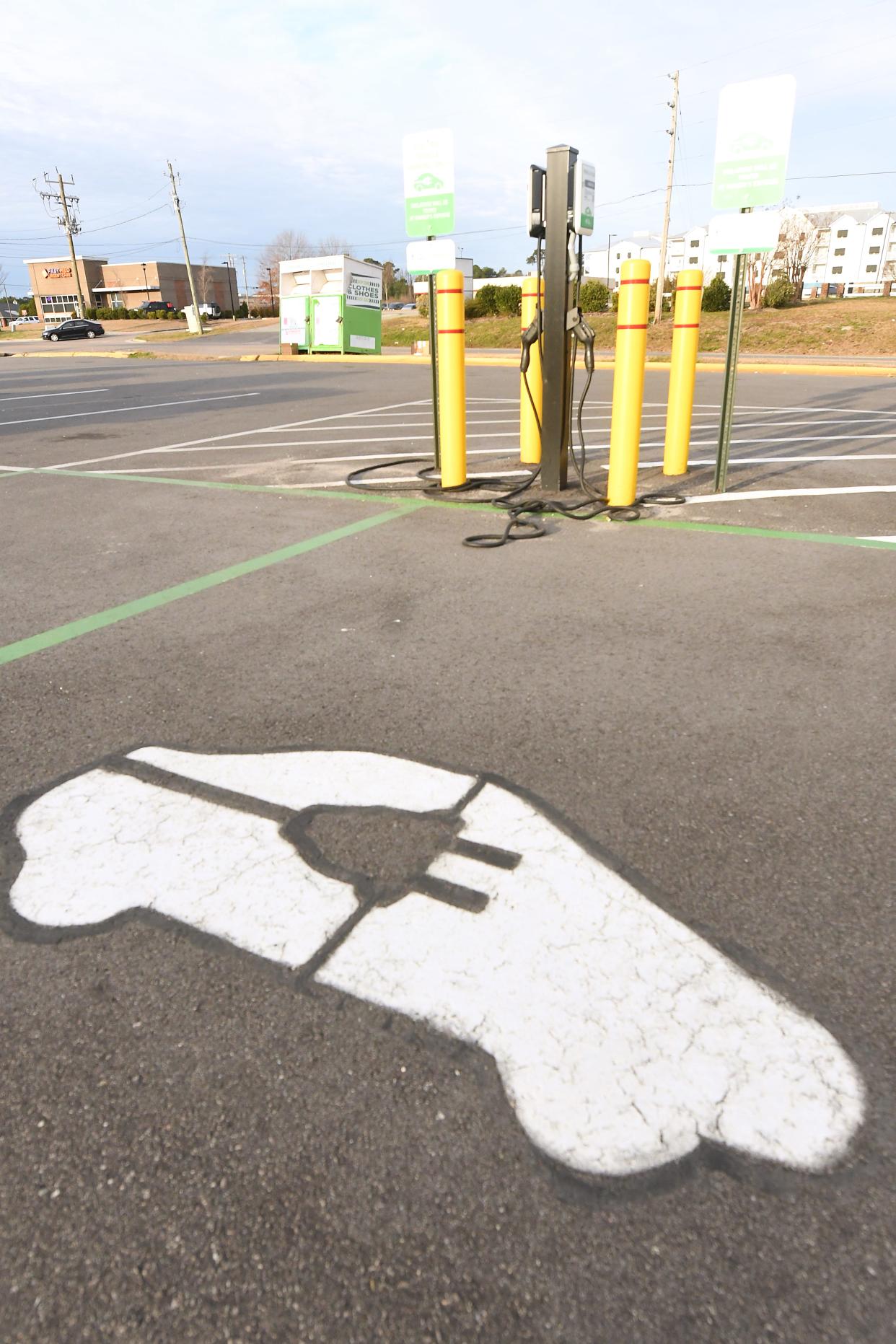
- Oops!Something went wrong.Please try again later.
A frustrated New Hanover County Commissioner Rob Zapple shook his head.
"I think this is a wonderful opportunity," he said of the proposal to require future developments with large parking lots built with a certain number of spaces designed to be future electric vehicle (EV) charging stations. "It's something that's good for the environment and shows that we're leading the way into the future."
But the amendment proposal, with the stated goal of “futureproofing” development in the unincorporated county so that new sites would be “EV ready,” wasn't as popular with several other commissioners at a recent board meeting.
"This seems premature," said Commissioner Dane Scalise, noting that less than 1% of registered vehicles in New Hanover County are EVs.
Commissioner LeAnn Pierce said the idea was something that the county should encourage developers to do, but she felt uncomfortable forcing the private sector to embrace something the market may not want yet.
“Maybe years from now it's something we should look at," she said. "But right now, I don’t think we need to require it.”
Public or private?
Another unfunded government mandate or a change to get ahead of the inevitable shift from internal combustion to electric power? Nationally and locally, a debate is emerging about what role the public sector should play in helping, some would say pressuring, people to park their greenhouse-gas spewing vehicles for shiny, quiet and clean EVs.
Politics also is getting sucked into the question over tailpipes, with Democrats seeing the increased adoption of EVs as a relatively easy and important step in battling climate change while Republicans push for the mandates to be scaled back so as not to hurt economic growth and place more financial burdens on residents and businesses.
President Joe Biden has set a goal of having 50% of all new vehicle sales be electric by 2030, while Democratic-controlled California intends to ban the sale of gas-powered cars by 2035. Closer to home, goals set by Gov. Roy Cooper, also a Democrat, include having 1.25 million electric vehicles on the state's roads by 2030, up from roughly 62,000 at the end of 2023, and proposed rules to get more electric trucks and busses on North Carolina highways starting in 2027.
County/State | EVs | Hybrids | Gas vehicles |
New Hanover | 1,220 | 4,865 | 164,078 |
Brunswick | 635 | 3,617 | 136,254 |
Pender | 217 | 1,130 | 55,254 |
North Carolina | 60,825 | 197,509 | 7,967,724 |
But former President Donald Trump has promised to reverse a lot of the Biden administration's EV initiatives if returned to the White House, and the GOP-controlled N.C. General Assembly included a provision in last year's state budget that bans the state from adopting the Advanced Clean Truck Rule (ACT), which would have required vehicle manufacturers to sell an increasing number of zero-emission trucks in the coming years. Legislators also raised taxes and other fees EV drivers must pay to cover their lack of gas tax payments.
The public also is slowing down the pace of EV adoption, even as EV production and the associated supply chain ramps up and overall sale numbers are up − although not enough to absorb the increasing number of EVs that are rolling off assembly lines and stem the red ink bleeding from many car companies' bottom lines. General Motors and Ford paused work on new EV factories, and Honda abandoned plans to build an affordable EV with GM. A price war started by Tesla has stabilized its sales, but has eaten into its profit margin and placed intense financial pressure on other EV-only companies like Rivian, Lucid and Fisker.
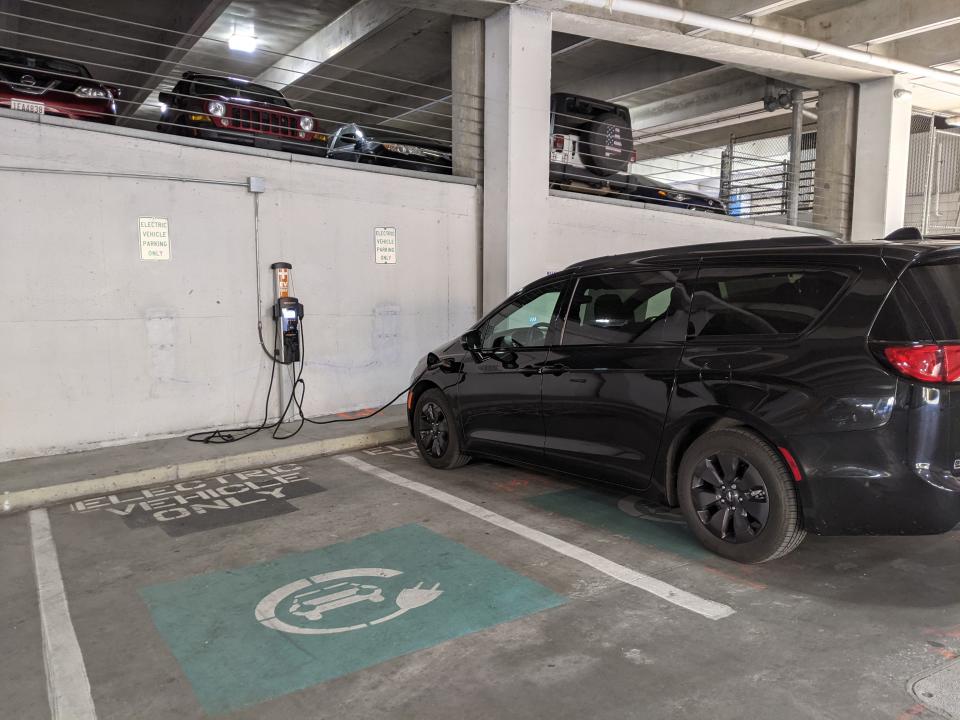
Making charging easier
Environmentalists and clean air advocates, however, say the long-term prognosis for EVs is as bright as ever, and there were always going to be some bumps in the road when trying to make the biggest transportation revolution since Henry Ford started rolling his Model T off the assembly line more than a century ago.
"We can see the future is electric," said Stan Cross, electric transportation director with Southern Alliance for Clean Energy. "If we don't start building and preparing for an electric future, we’re passing on a cost we don’t need to pass on.”
Still, hurdles remain to be cleared. One is price. So far, early EV adopters have been fairly well-off drivers who were willing to fork out lots of cash for a "green" vehicle, and manufacturers eagerly pursued that market. But those prices are dropping as more car companies start rolling out EVs, and Chinese manufacturers are making a strong push − with huge support from Beijing − to make affordable electric cars. The average price of an EV in the U.S. was about $53,000 in 2023, according to Kelley Blue Book, down from more than $61,000 in 2022.
The other is charging, or more precisely the lack of access to a convenient plug.
Federal and state governments, along with some private companies, are working hard to roll out publicly accessible chargers along major highways and in areas frequented by the driving public, like parking decks and commercial centers.
But the vast majority of charging is still done at home or at work and that's where the plug shortage can be a major concern, especially if you don't live in a single-family home or somewhere that has a garage or driveway where a personal charger can be installed.
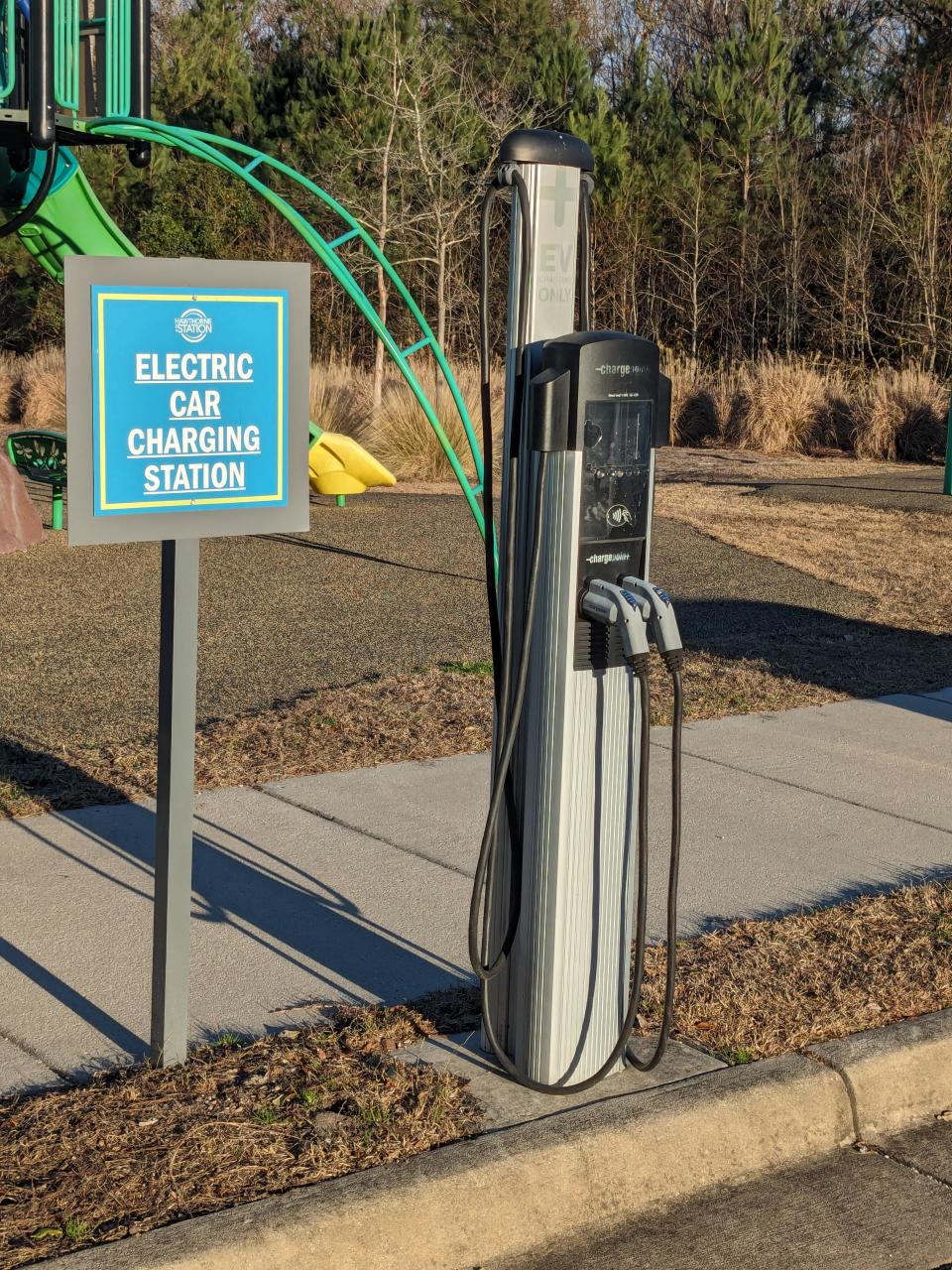
Easy and cost effective
Based loosely on EV policies adopted by Apex, New Hanover County planning officials proposed that 20-30% of parking spaces − depending on the type of development − in new parking lots of 25 or more spaces be built with the conduits pre-installed for possible future conversion to a charging station, with a cap of 15 electric vehicle-ready spaces per development. County officials stressed this amendment, which staff has been working on for more than a year and was approved by the county planning board, did not mean that charging stations would have to be installed at the time of construction, only that the spaces be ready for conversion if and when demand warranted it.
"This amendment is intended to make it as easy and cost effective for property owners to install EV charging stations in the future when it becomes feasible and/or necessary," the proposal states. "There is general agreement that a large number of EV charging stations will be needed in the future, but there is not a clear picture of how many that will need to be."
Wilmington also is looking at possibly tweaking its existing EV charging ordinance, which require 2% of parking spaces to be EV-ready and 2% to be fully outfitted with charging stations.
According to the U.S. Department of Energy, the Wilmington area had 24 public fast chargers and 26 slower, Level 2 public chargers as of early 2023. With New Hanover's EV numbers expected to grow by more than 200% by 2026, and that doesn't include tourists driving their EVs to the region, officials say it's obvious more capacity is needed.
But the business community has pushed back against the proposal, noting that even the energy department says the private sector is keeping up the demand for charging stations. They also say the market will add more if chargers are seen as a must to attract customers and business, similar to what free Wi-Fi has become in recent years.
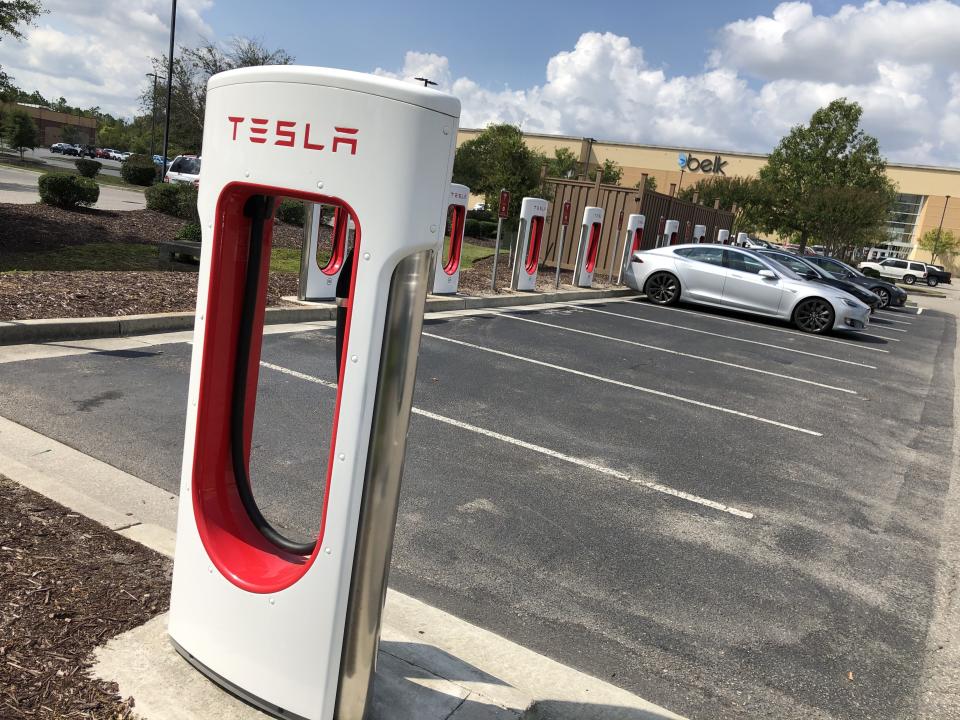
Recent projects that echo that sentiment are new chargers at Smithfield's Chicken restaurants in Ogden and Leland and Lowes Foods in Murrayville, which opened a 12-plug Tesla Supercharger station last summer.
"These stations are about making that usage convenient, whether a person is on their way to the beach or a typical shopping trip near home," Lowes spokesperson Kelly Davis said last year. "The stations allow our guests to charge their EVs in a safe and clean environment while they are in our store or a nearby shop or restaurant."
Several apartment complexes, where chargers are nearly universally in short supply, also are adding plugs to appeal to green-minded renters.
GETTING A CHARGE WITH YOUR FOOD: A new Tesla charging station is coming to Wilmington. Here's where and why.
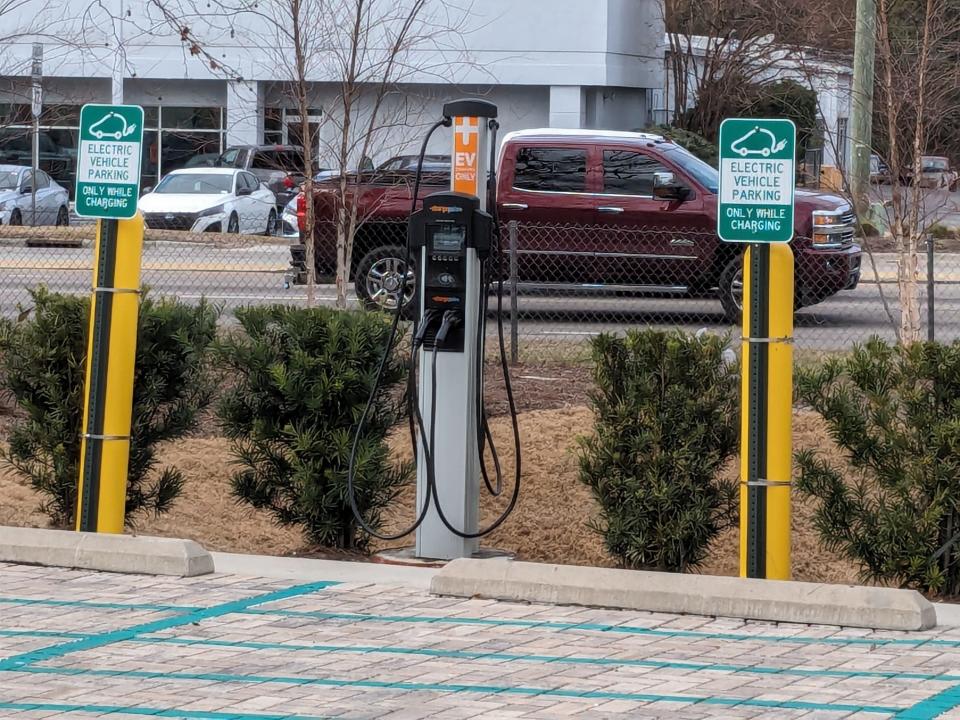
'Something best left to the private sector'
At last month's commissioners' meeting, County Planning Director Rebekah Roth said one of staff's concerns was that what makes business sense isn't the same as meeting the community's needs, especially when it comes to where public chargers are located and where the need is the greatest.
But Commissioner Scalise said a smart developer would recognize an underserved market and move to fill in the gap if demand warranted it. He added that county policies also should make sense for all taxpayers and residents, not just the minute number who happen to own EVs.
"In my estimation, this is something best left to the private sector," Scalise said.
Among those who spoke out against the proposal was John Hinnant, vice president of Eastern Carolinas Commercial Real Estate and a commissioner candidate in this fall's election. He said offering incentives, such as additional density, to get developers to add more EV-ready spaces might be a better path forward.
“You’re carrying a stick when you probably need a carrot,” Hinnant told the board.
In the end, the commissioners decided to table a vote until June to allow staff to work with city planners to potentially coordinate rules and gauge sentiment among local residents and the business community.
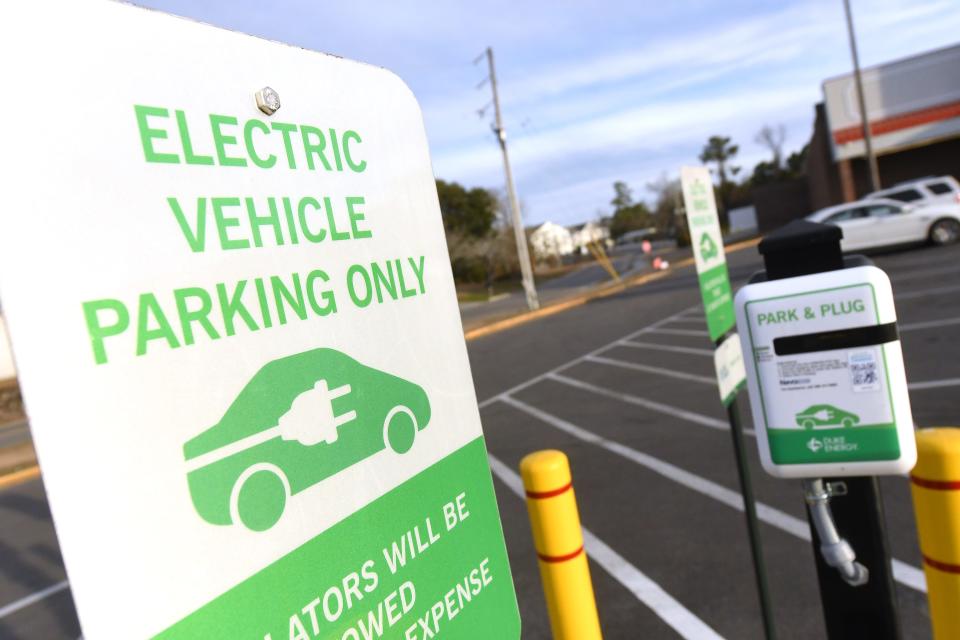
Staying ahead of the curve
North Carolina has recently been a mixed bag when it comes to adapting to the rising impacts from climate change and a changing economy, which is largely about saving energy and reducing emissions.
A push by state Rep. Deb Butler, D-Wilmington, to have all new homes pre-wired − in the form of a 240-volt circuit in garages − for an electric car charger has gone nowhere, and the Republican-led legislature recently rejected changes to the state building code that would make new homes more energy efficient on cost grounds, even though the additional upfront costs would easily be covered over time by lower energy bills for property owners.
To many clean energy advocates, state regulators also are dragging their heels in making Duke Energy embrace more "green" energy choices like wind and solar as it looks to replace its remaining dirty coal-fired power plants. The utility giant has proposed adding new natural gas-powered plants, which it says offer a more reliable power source, as it looks to meet law-mandated reductions in the state's energy carbon footprint by 70% from 2005 levels in the coming years and reach carbon neutrality by 2050. Environmentalists say that's just another fossil fuel source that will emit greenhouse gasses and lock North Carolina ratepayers into expensive payments for decades to come.
But the state has been aggressive in courting the businesses that will help countries, states and cities with their "green" transition away from fossil fuels, including offering incentives to help land a $600-million electric vehicle battery plant in Brunswick County. The factory by Indian-based Epsilon Advanced Materials is expected to employ around 500 when it is up and running in 2026.
CHARGING FORWARD: Emerging global leader in electric-vehicle manufacturing invests in Brunswick County
Will Scott is Environmental Defense Fund's director for Climate and Clean Energy Southeast. He said prudent planning and investments by local governments, such as working to build an EV-ready community, could pay huge dividends down the road.
"Vehicle electrification is coming and cities that do the work of preparing for it now will have an advantage on those that adapt their infrastructure and standards later on," Scott said.
Cross echoed the sentiment, saying that communities that are caught lagging as the electric revolution continues to pick up steam risk missing out on growth and economic opportunities. Like Scott, he also noted that there has never been a better time for businesses and individuals to invest in EV infrastructure or vehicles with the federal government and even some states offering tax credits and other funding programs to help with costs.
“It’s the role of local governments to look to the future, and making sure future parking lots are EV-ready is a simple thing to achieve and allows you to stay ahead of the curve," Cross said.
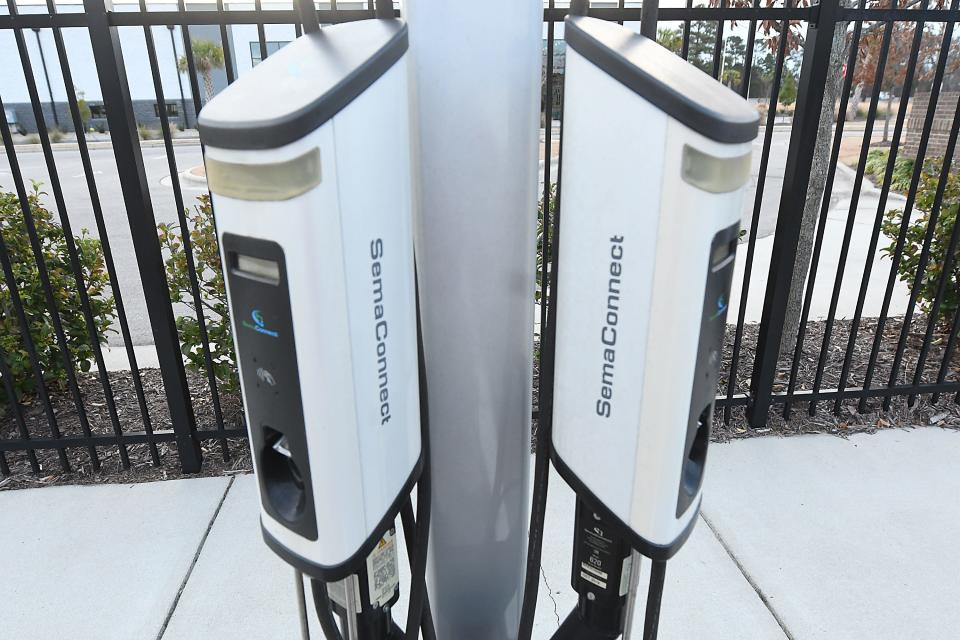
Reporter Gareth McGrath can be reached at GMcGrath@Gannett.com or @GarethMcGrathSN on X/Twitter. This story was produced with financial support from the Green South Foundation and the Prentice Foundation. The USA TODAY Network maintains full editorial control of the work.
This article originally appeared on Wilmington StarNews: Should New Hanover require EV-ready parking spots in new projects?

